Trazodone: Side Effects, Withdrawal, & Treatment
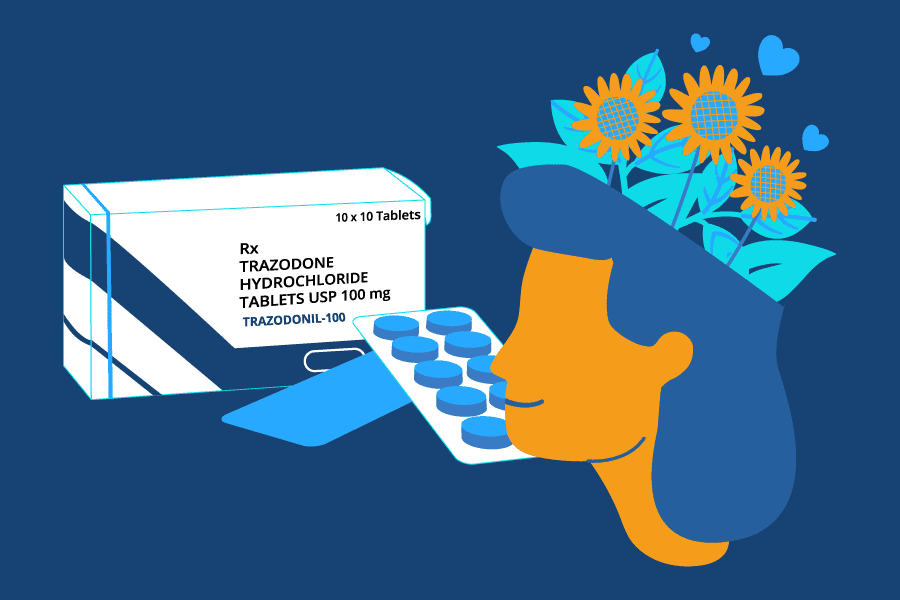

Trazodone is an antidepressant used to treat major depressive disorder.
Sometimes, it is used as an off-label treatment for other conditions, such as insomnia, schizophrenia, and anxiety.
Trazodone belongs to a class of medications called serotonin modulators, which means they work by altering the activity of post-synaptic serotonin receptors and by inhibiting the reuptake of serotonin.
While trazodone is not considered a highly addictive prescription medication, it still has a potential for misuse and dependence.
Individuals who abuse trazodone or who are prescribed it should be aware of its effects and seek professional advice.
Trazodone is mainly used to treat depression.
However, it is also sometimes used to treat anxiety, insomnia, and schizophrenia.
Brand names for trazodone include:
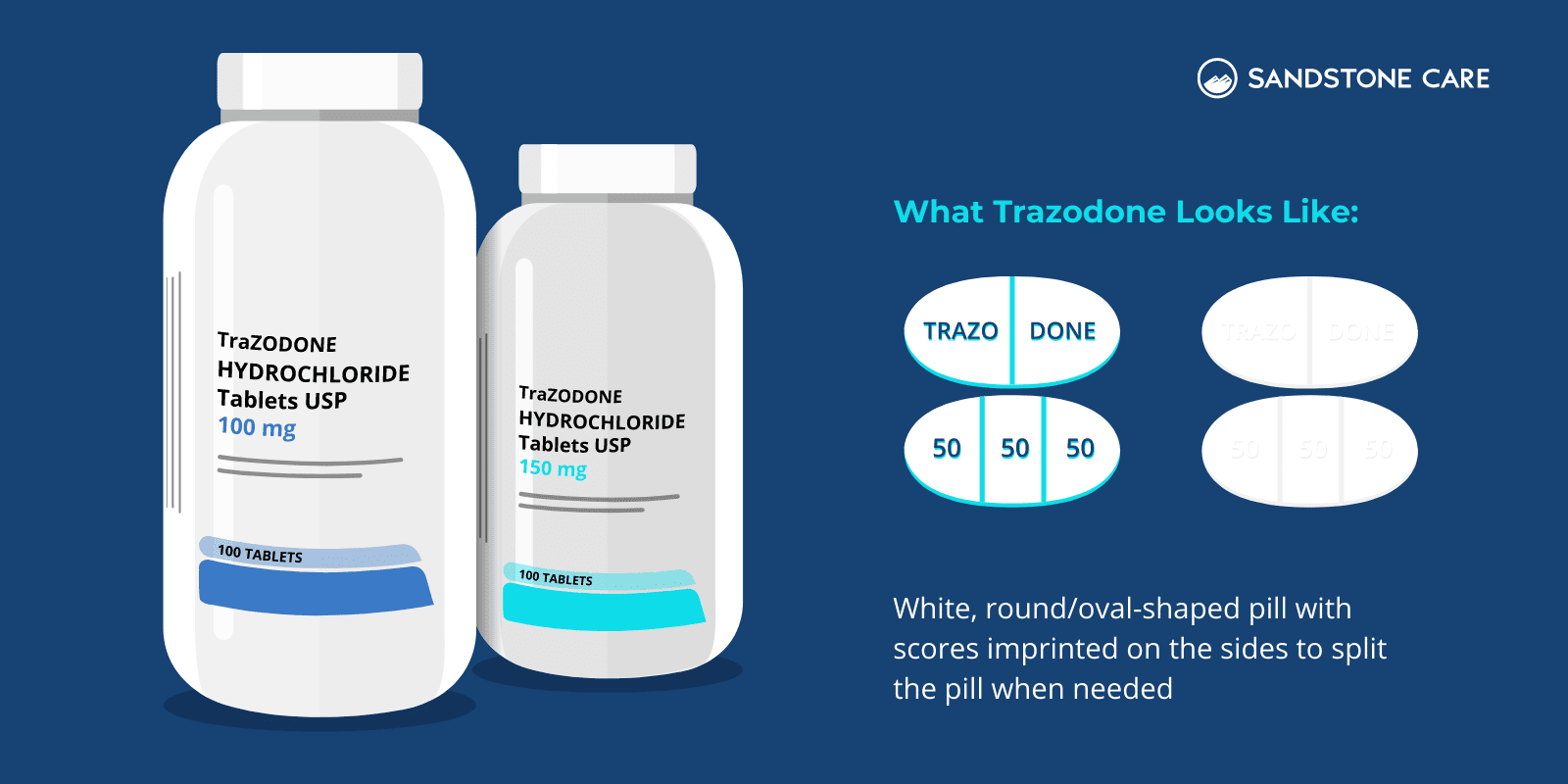
Trazodone is not considered highly addictive, yet there is still potential for misuse and dependence.
A study done by Psychopharmacology discussed the abuse potential for three different drugs, including trazodone, Ambien, and Halcion.
Findings suggest that trazodone is less addictive than the other two drugs in the study, yet it is still misused and can cause physical dependence, especially when used for a long period.
According to Substance Abuse and Rehabilitation, most cases of antidepressant abuse occur in individuals with other substance use and mood disorders.
Trazodone is a serotonin modulator, or in the serotonin-antagonist-and-reuptake-inhibitor (SARI) class of medications.
Serotonin is a neurotransmitter that plays an important function in mood stabilization. When a person’s serotonin levels are low, it can contribute to depression and other mental health disorders.
Serotonin modulators, like trazodone, work by targeting certain serotonin receptors, including the 5-HT2A receptor.
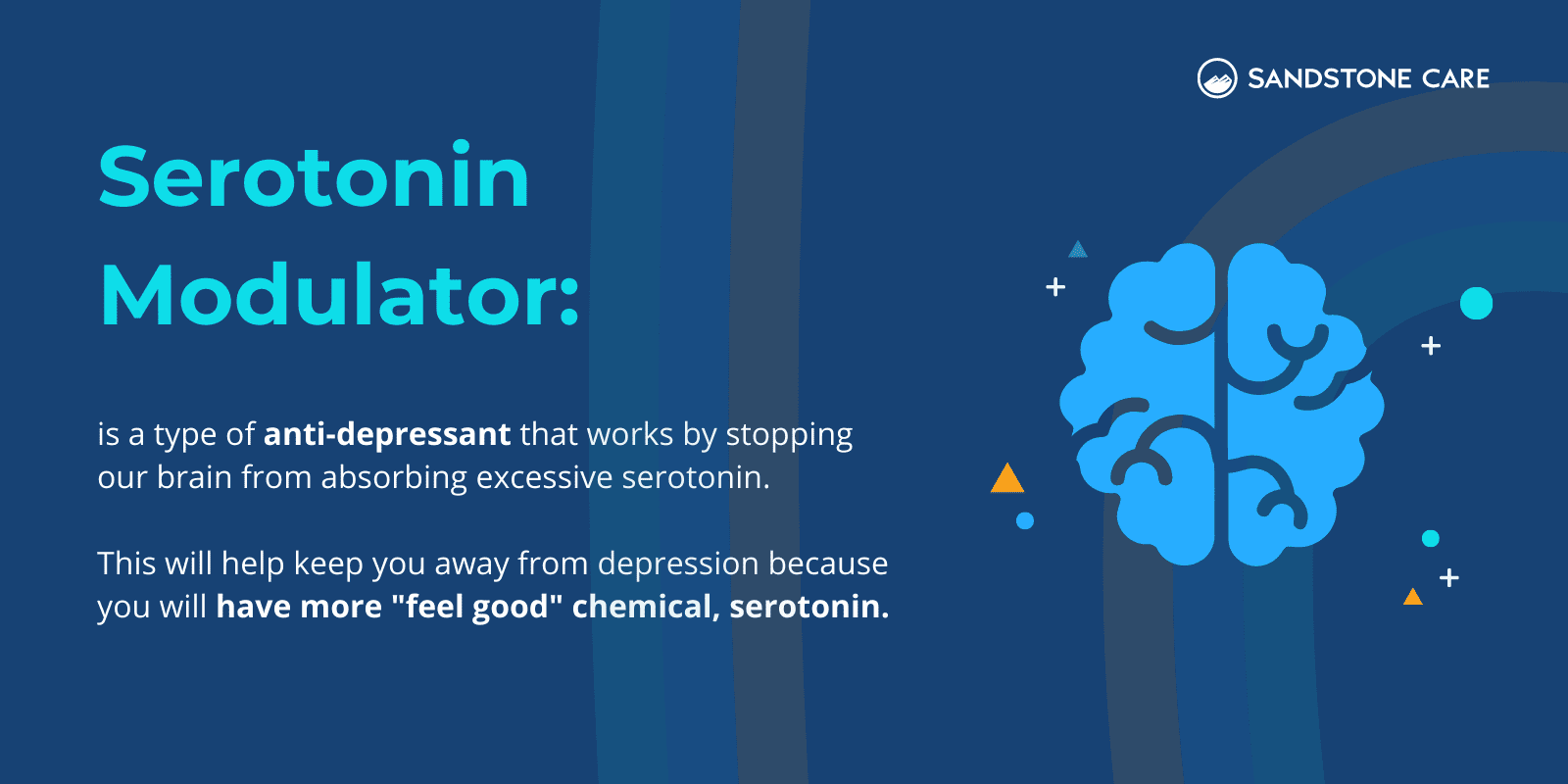
Trazodone is usually white and round or oval-shaped.
It also has scores imprinted on the sides that may be used to break the tablet in half to split the medication into two doses if recommended by your doctor.
Trazodone comes as a tablet that should be taken by mouth.
It is usually recommended to take trazodone with a meal or snack two or more times a day.
The tablets are either taken whole or broken in half where indented and taken.
If prescribed, it is important to follow your doctor’s orders carefully, along with any directions on your prescription label. A person should not take more or less than what is prescribed without consulting with their doctor.
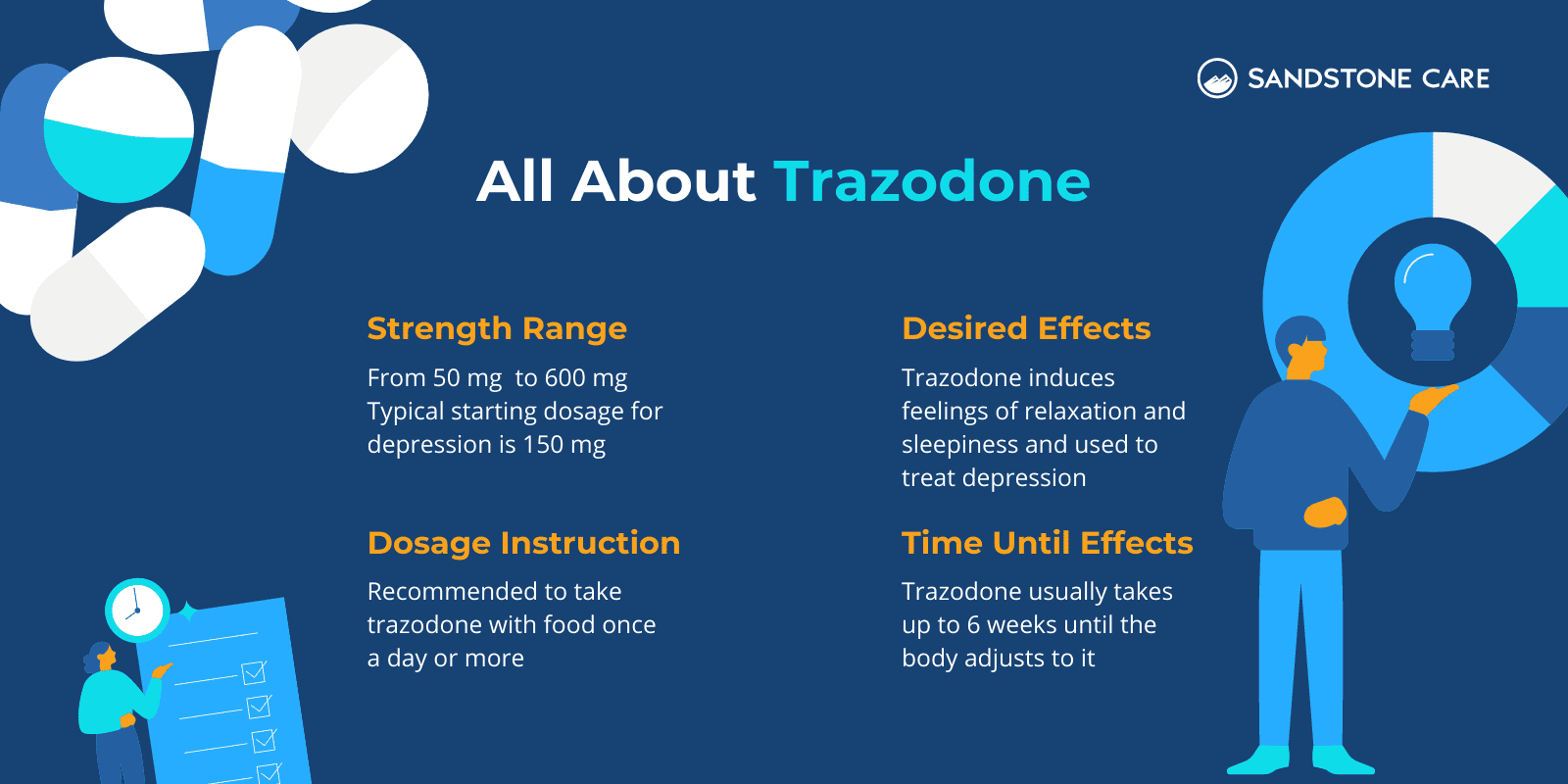
Most people who have been prescribed trazodone report feelings of relaxation and sleepiness.
It can also help people improve their mood and manage the symptoms of depression.
Some people may abuse trazodone for its sedative effects and to achieve a “high.” While it may not produce a sense of euphoria similar to other drugs like marijuana, it can make a person feel extremely relaxed and drowsy, and some people find pleasure in it.
Additionally, when first taking trazodone, a person may feel that their symptoms of depression or anxiety are worsening.
This can be because the body is adjusting to new chemical levels and changes. However, it is important to let your doctor know if you are experiencing adverse side effects.
Trazodone is not known to be habit-forming. However, it should only be taken as prescribed to avoid misuse and potentially dangerous adverse effects.
It is not uncommon for trazodone to be prescribed daily and to be taken in the evening.
However, if a person is misusing trazodone, taking it every night can be extremely harmful, increase the risk of overdose, and have serious negative effects on their physical and mental health.
It can take a couple of weeks for trazodone to start to work and for a person to see improvements.
It can take the body time to adjust to the medication. For some people, trazodone can take up to 6 weeks to work.
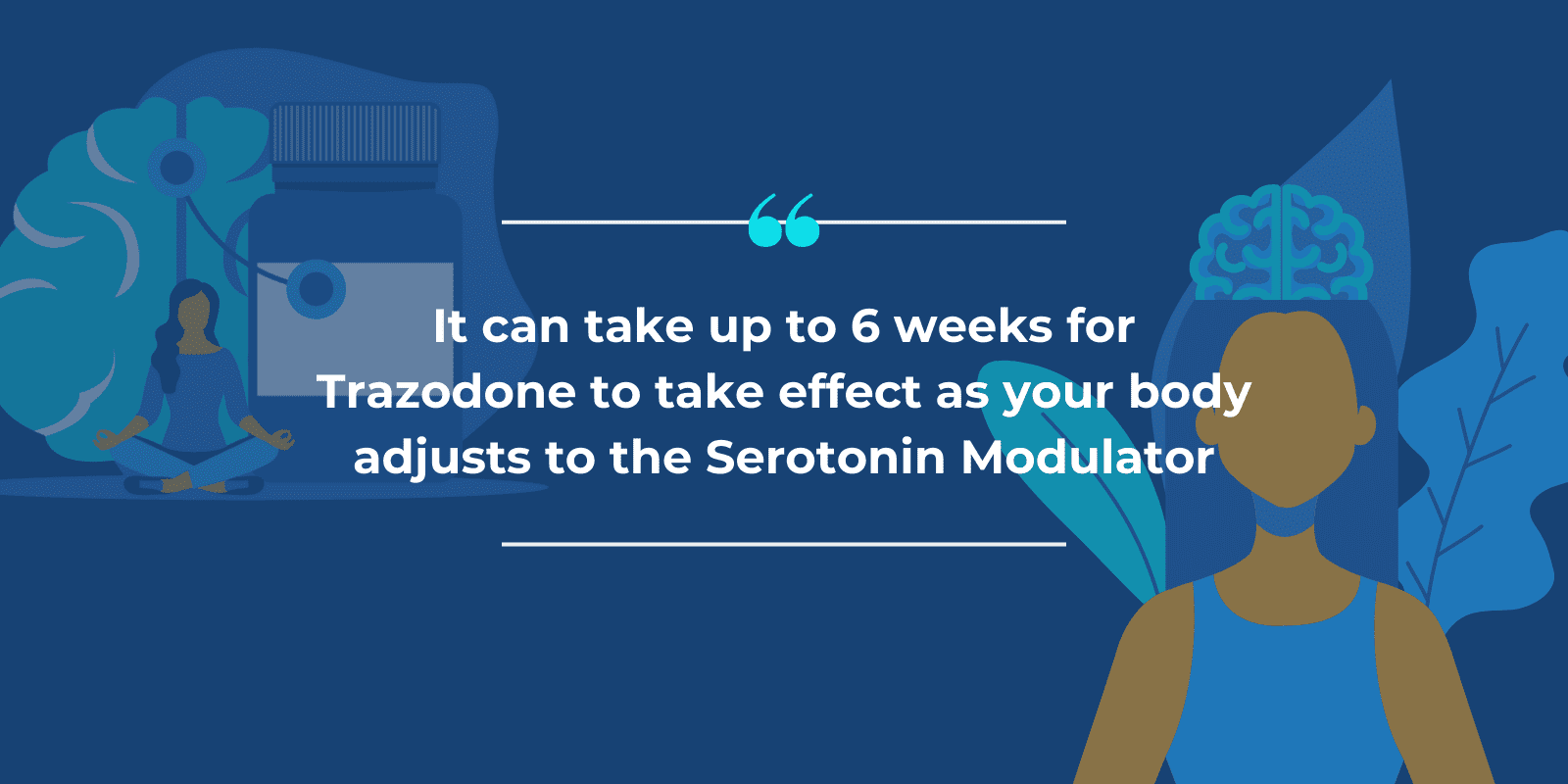
Trazodone is sometimes used as an off-label treatment for sleep and anxiety.
It is always important to let your healthcare provider know any current medications or supplements you are taking, along with any medical history or conditions you may have before starting trazodone.
If you are planning to become pregnant, are pregnant, or are breastfeeding, consult with your healthcare provider about the safety of taking trazodone.
Trazodone also contains a boxed warning of an increased risk of suicidal thoughts and behaviors in pediatric patients.
It should also be used carefully with elderly individuals as it may increase the risk of hyponatremia, which refers to a low sodium level in the blood.
Additionally, individuals with kidney failure or liver failure should use trazodone with caution and talk to their doctors about risks and safety.
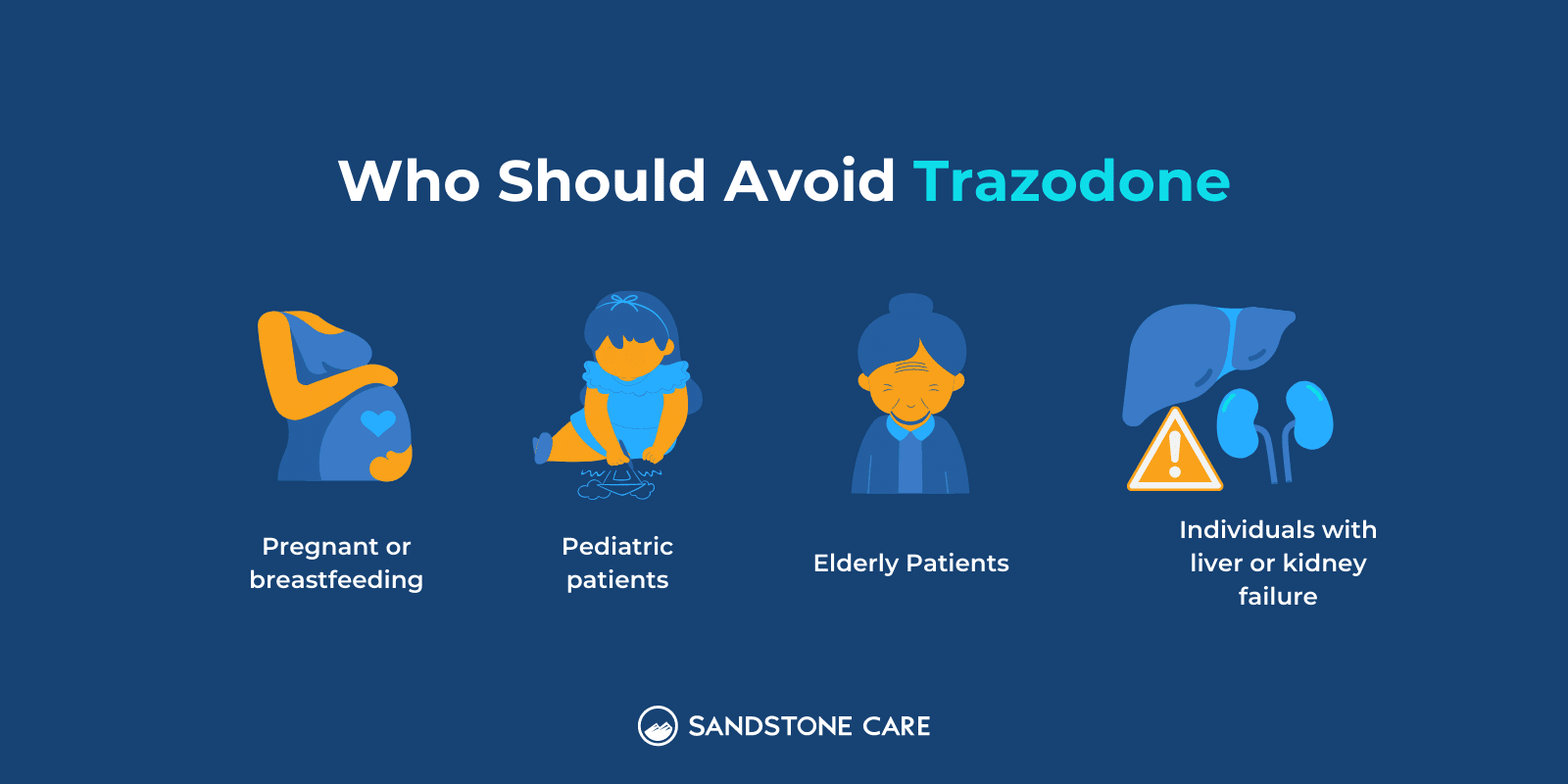
When used for depression, the typical dosage of trazodone is 150 mg.
Dosages for trazodone can range from a low dose of 50 mg to 600 mg for hospitalized patients.
Dosages typically start at 150 mg and may be increased in 50 mg increments depending on the individual’s response to the medication.
Trazodone is usually taken as a single dose per day.
Sometimes, a doctor may recommend a person split it in half and take it twice a day.
You should only take trazodone as it is prescribed to you, no more and no less, and if you plan on making any changes to your medication or plan on stopping use, consult with your doctor first.
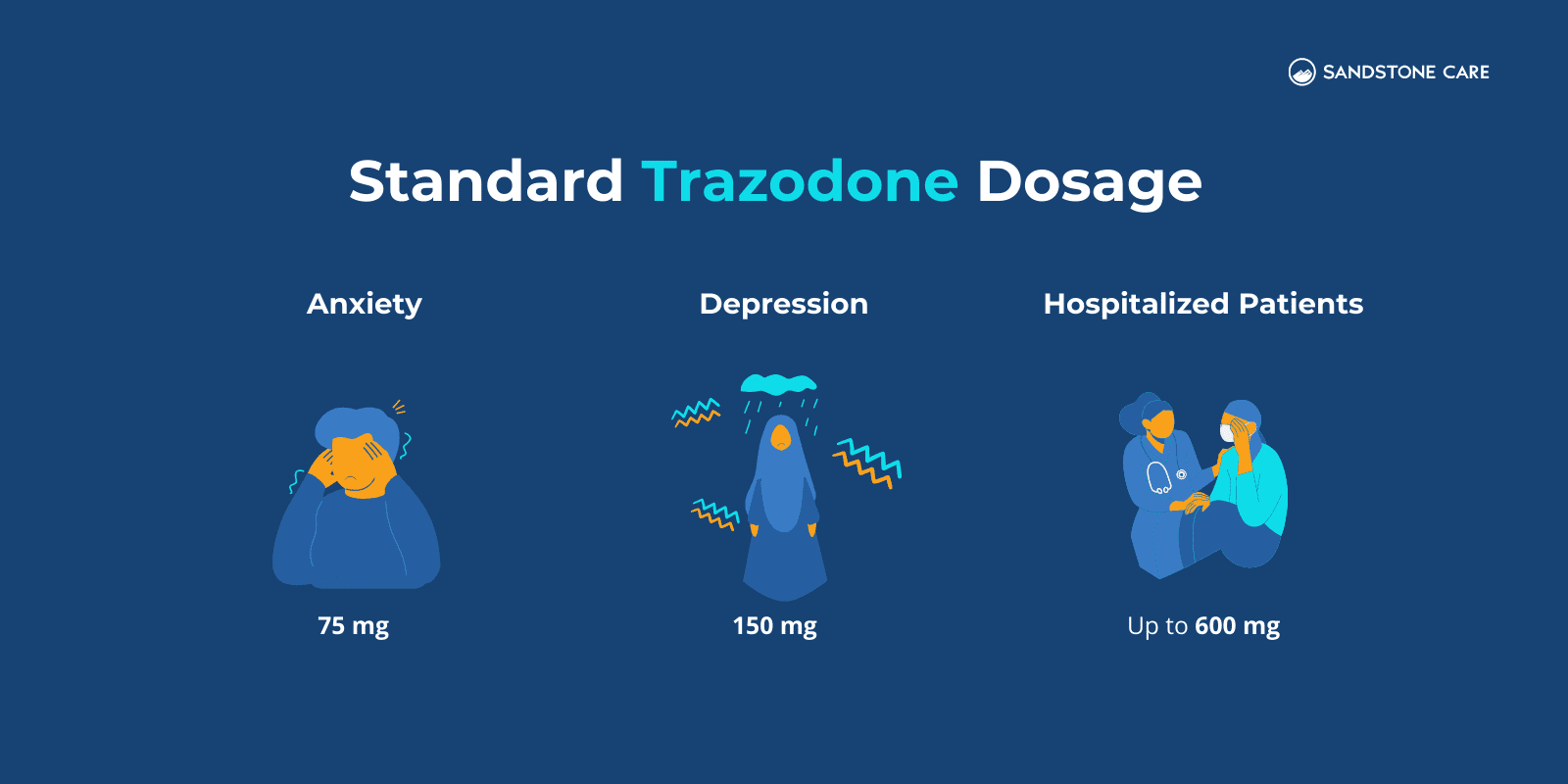
50 mg of trazodone is not considered a lot; it is usually the starting dose.
Trazodone is available in 25 mg, 50 mg, 100 mg, and 300 mg oral tablets.
However, taking any dose of a medication when it is not prescribed can be very dangerous and result in harm to both the brain and body.
Alcohol can worsen the effects of trazodone, and mixing the two can become dangerous.
Mixing alcohol with antidepressants like trazodone can not only make a person extremely drowsy but also make a person feel more depressed or anxious.
Individuals who misuse trazodone often do so by combining it with other substances. Mixing substances like trazodone and alcohol can increase a person’s risk of overdose and result in serious consequences.
Lexapro, or escitalopram, is another antidepressant medication used to treat depression and generalized anxiety disorder.
Taking escitalopram together with trazodone is usually not advised as it may cause adverse side effects and put a person at higher risk of serotonin syndrome.
It is important to let your doctor know if you are already taking Lexapro or any other antidepressants so that you can reduce the risk of negative and potentially dangerous side effects.
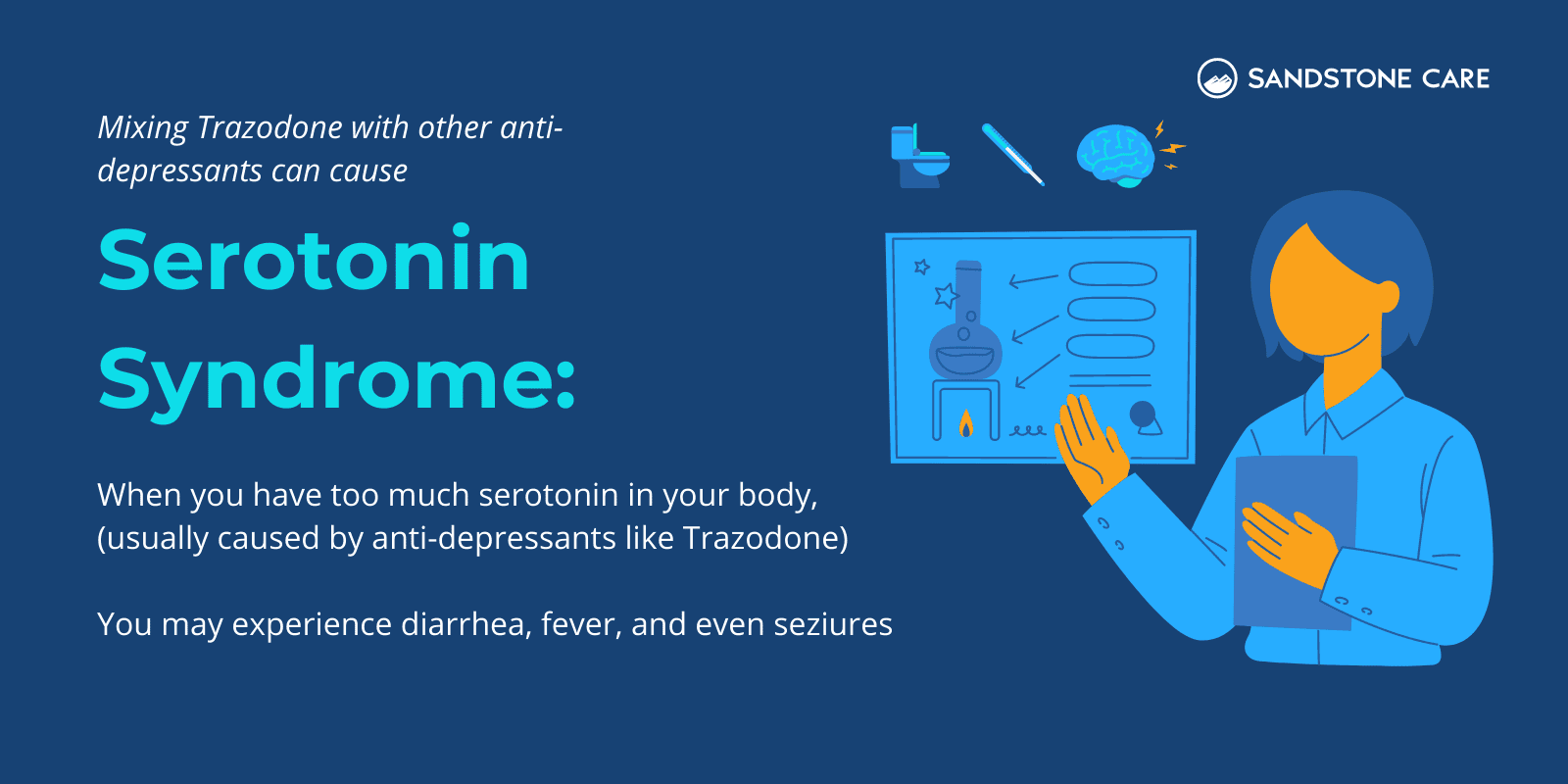
It is important to let your doctor know of any prescription medications and non-prescription medications you are taking, including vitamins and herbal supplements, before starting trazodone.
Herbal products and nutritional supplements that are especially important to mention include St. John’s Wort and tryptophan.
You should let your healthcare provider know if you are taking monoamine oxidase inhibitors (MAOIs) like tranylcypromine or isocarboxazid, as your doctor may typically recommend not taking the medications together.
Taking MAO inhibitors and trazodone together can greatly affect a person’s serotonin levels and cause a spike in a person’s blood pressure.
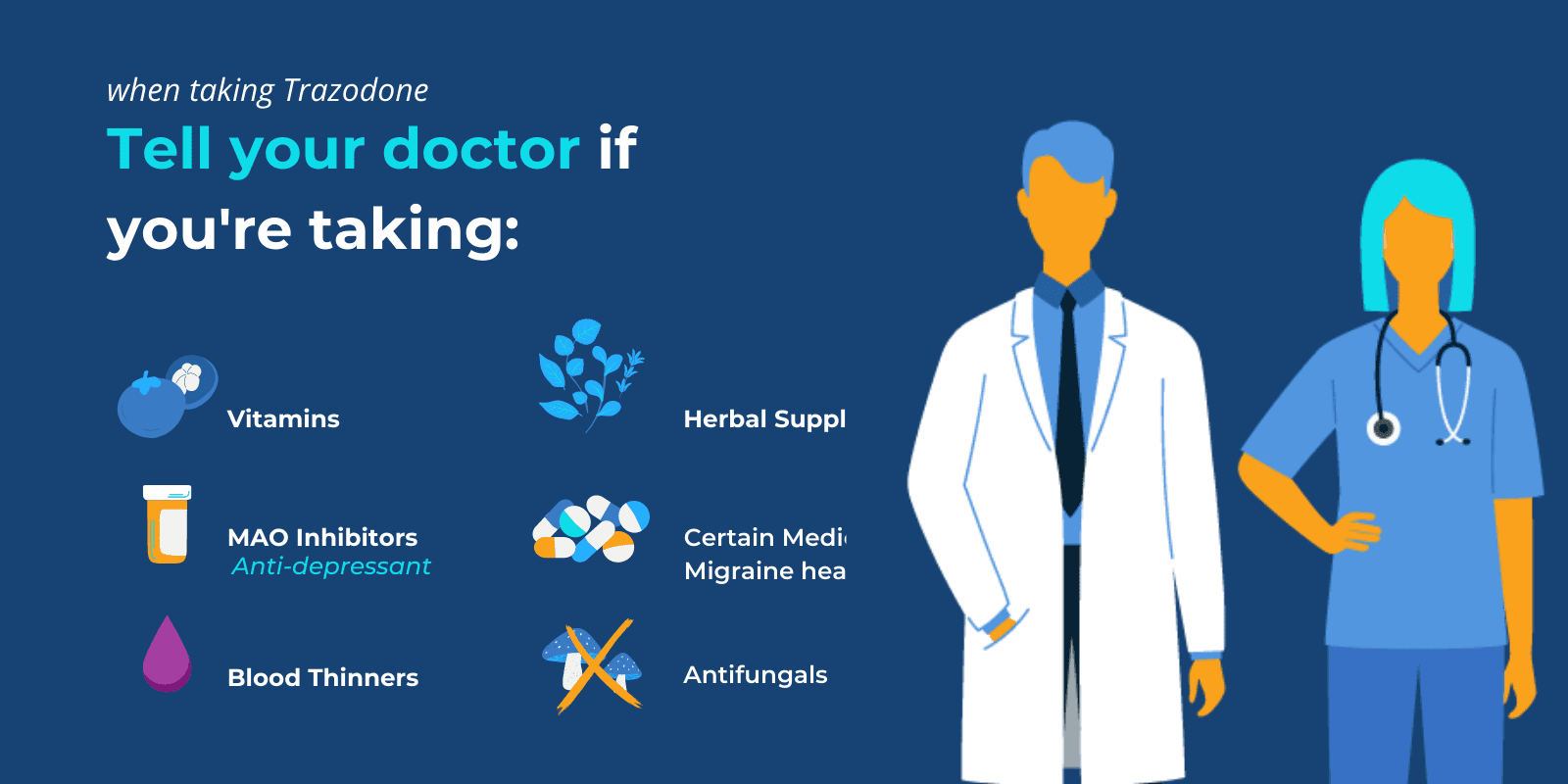
Important medications to mention include:
A person should also take caution before driving if taking trazodone, as its effects can cause impairment. Don’t drive or operate machinery until you know how this medication affects you and after consulting with a doctor.
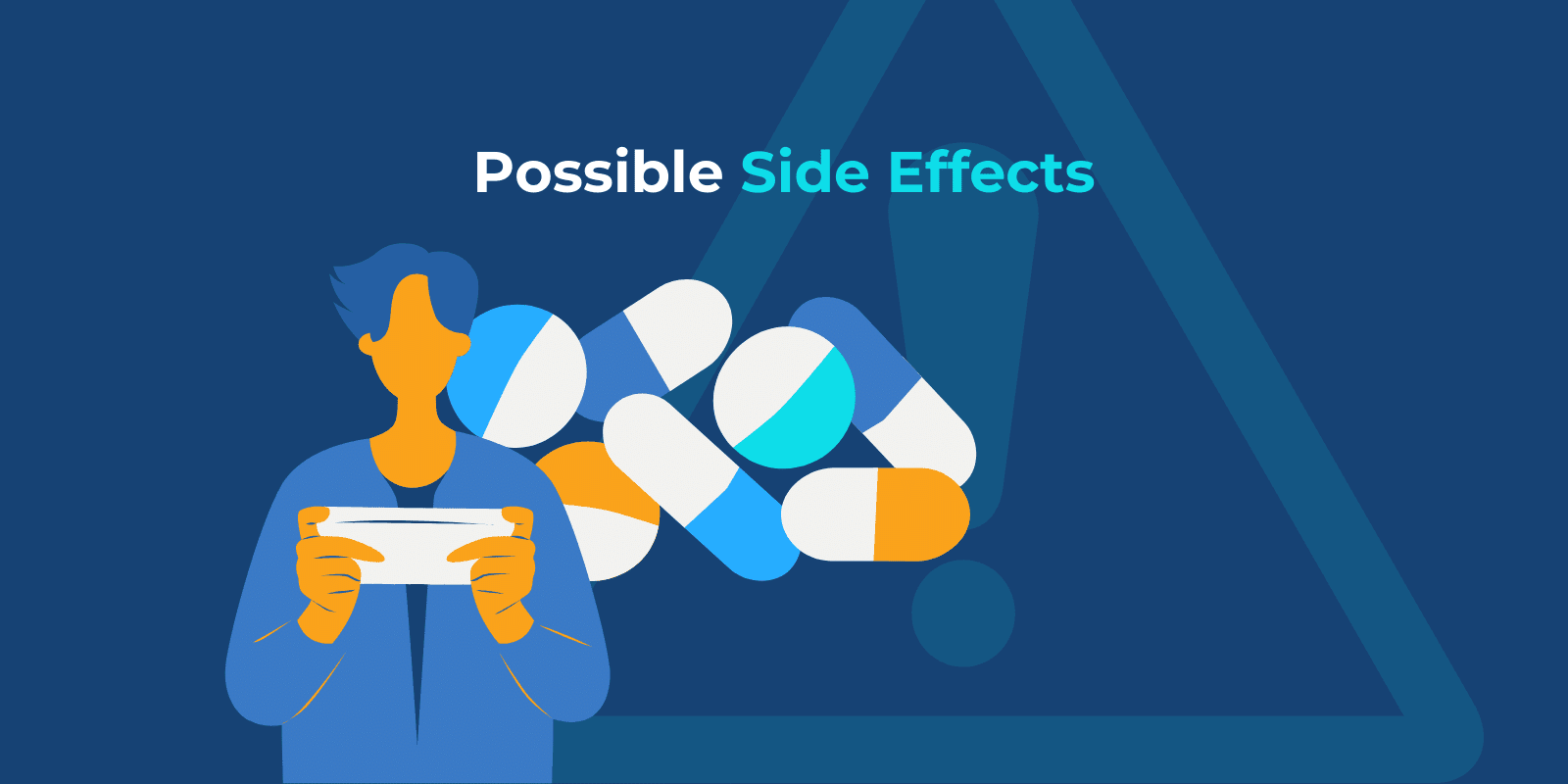
Side effects of trazodone can include:
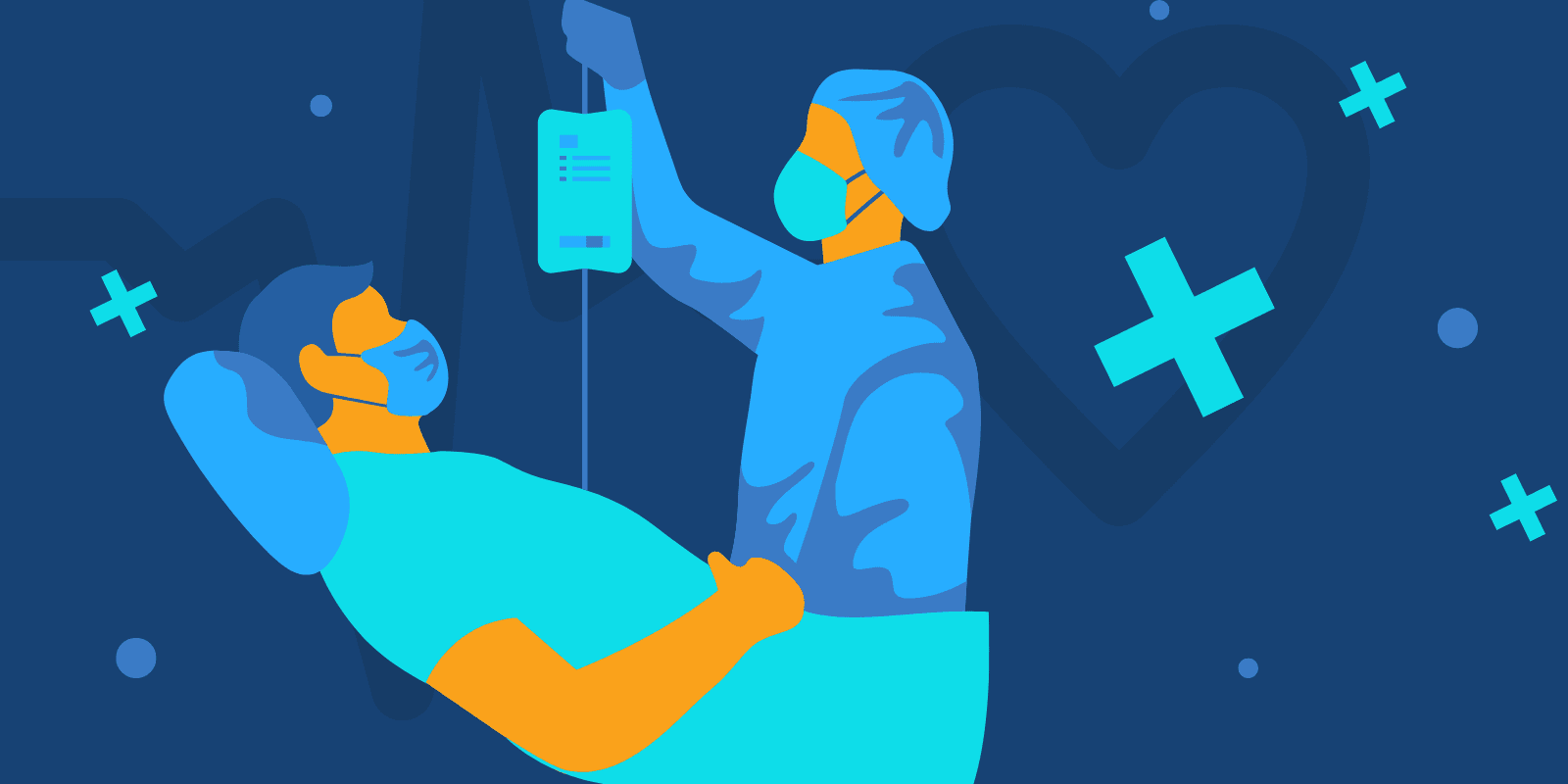
Serious side effects of trazodone can include:
Antidepressants like trazodone can also increase the risk of a person experiencing suicidal thoughts, especially in adolescents, children, and young adults.
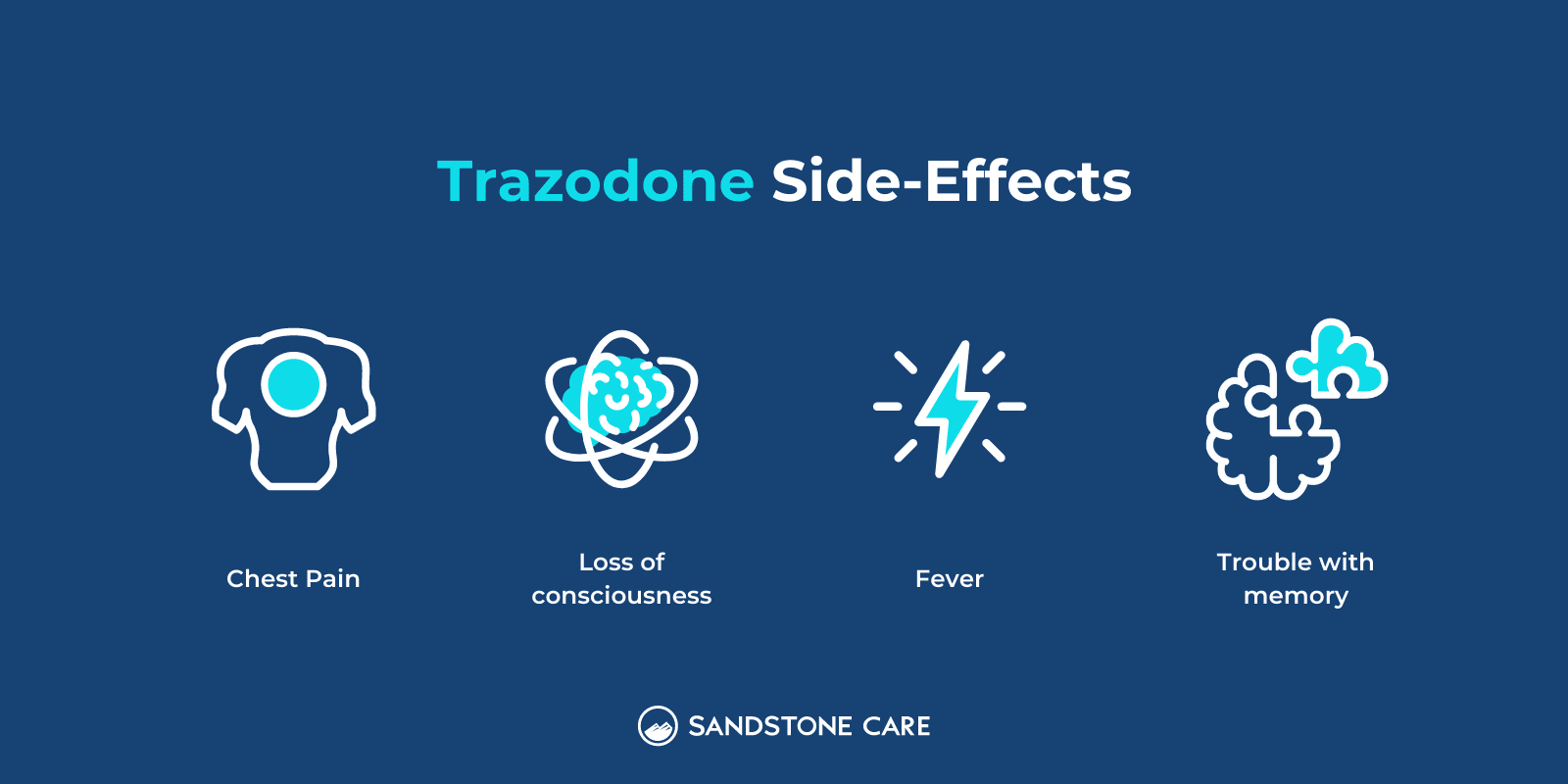
In rare cases, trazodone use can cause serotonin syndrome, a potentially life-threatening condition where a person’s serotonin levels are too high, causing them to experience both mental and physical symptoms.
If you or a loved one are experiencing suicidal thoughts, seek help. Call 911 or the national suicide prevention lifeline at 988. You are not alone, and there is help for you.
Trazodone may also cause a condition called angle-closure glaucoma, where the fluid in the eye causes a severe increase in pressure and can lead to vision loss.
Any individual who uses antidepressants for longer than 8 weeks faces the risk of developing a physical dependence on the drug, meaning that they can face withdrawal symptoms if they suddenly stop using the drug or significantly decrease their use.
The most common side effects of trazodone include drowsiness, dizziness, and nausea.
When a person first starts trazodone, they may feel that their depression or anxiety is worse because their body is adjusting to the new change.
Usually, in this case, the person tends to feel better after the first few weeks.
However, adverse effects of trazodone can include anxiety or depression.

Yes, trazodone can cause both changes in appetite and weight.
It can make a person more hungry and cause them to eat more and gain weight.
Trazodone could negatively affect a person’s heart.
It can cause a condition known as QT prolongation, which can involve a fast or irregular heartbeat and other potentially serious symptoms.
However, according to Psychopathology, trazodone has been shown to have little effect on cardiac conduction and had shown to produce less postural hypotension than other antidepressants and actually lowers heart rate.
Additionally, trazodone is not usually recommended for those who have suffered a heart attack at any point in their life.
Trazodone may affect a person’s thinking, concentration, and memory, according to MedlinePlus.
Trazodone is commonly taken as a long-term medication.
When used as prescribed, trazodone is considered generally safe. However, when misused, trazodone can harm both the brain and body.
Any person who takes antidepressants long-term, whether prescribed or not, has a risk of developing physical dependence.
In this case, the person should seek help from their doctor so they can safely manage their symptoms and reduce the risk of serious effects.
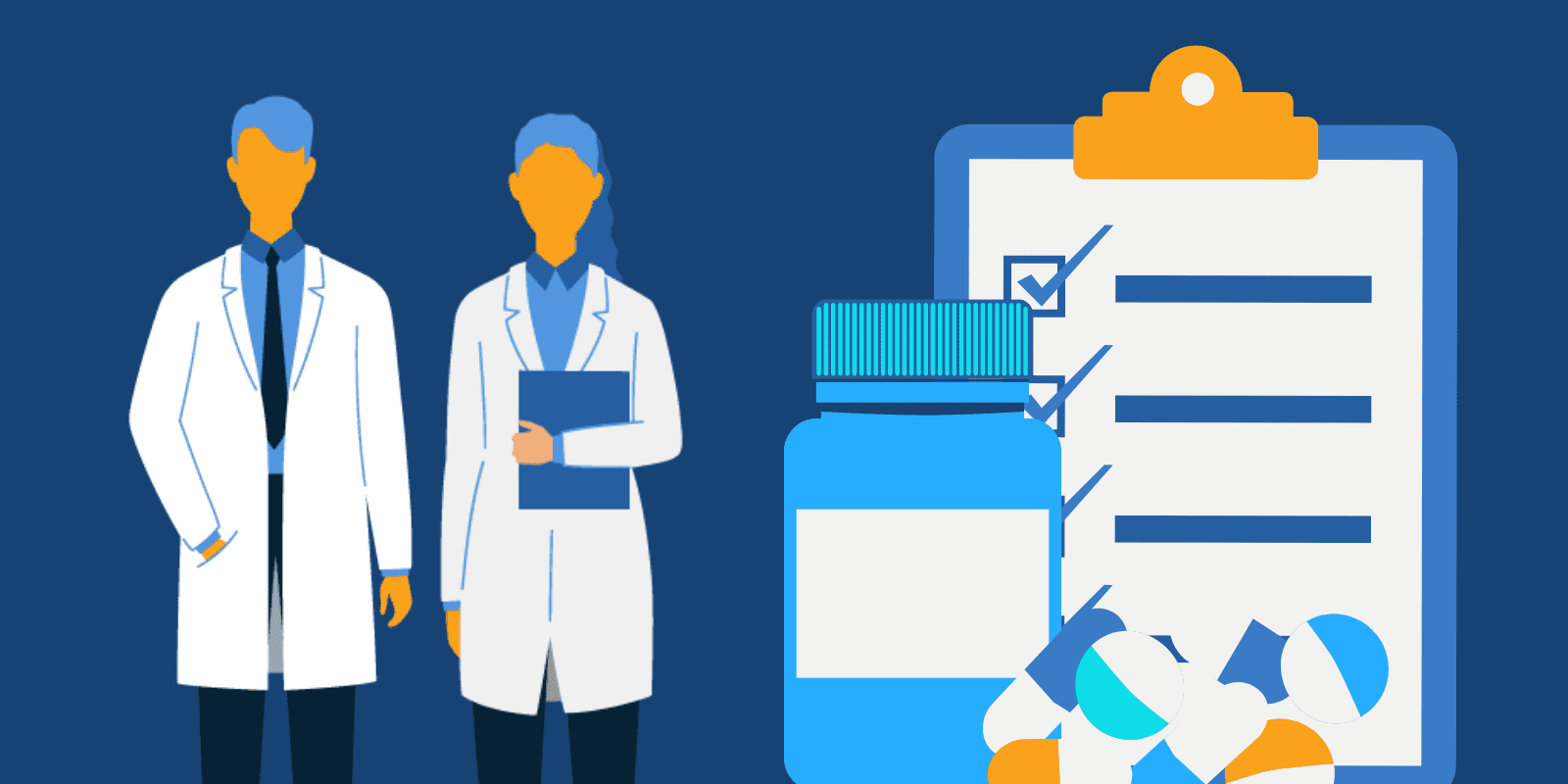
Trazodone is mostly used to treat depression, specifically major depressive disorder.
Trazodone is also sometimes used as an off-label treatment for anxiety.
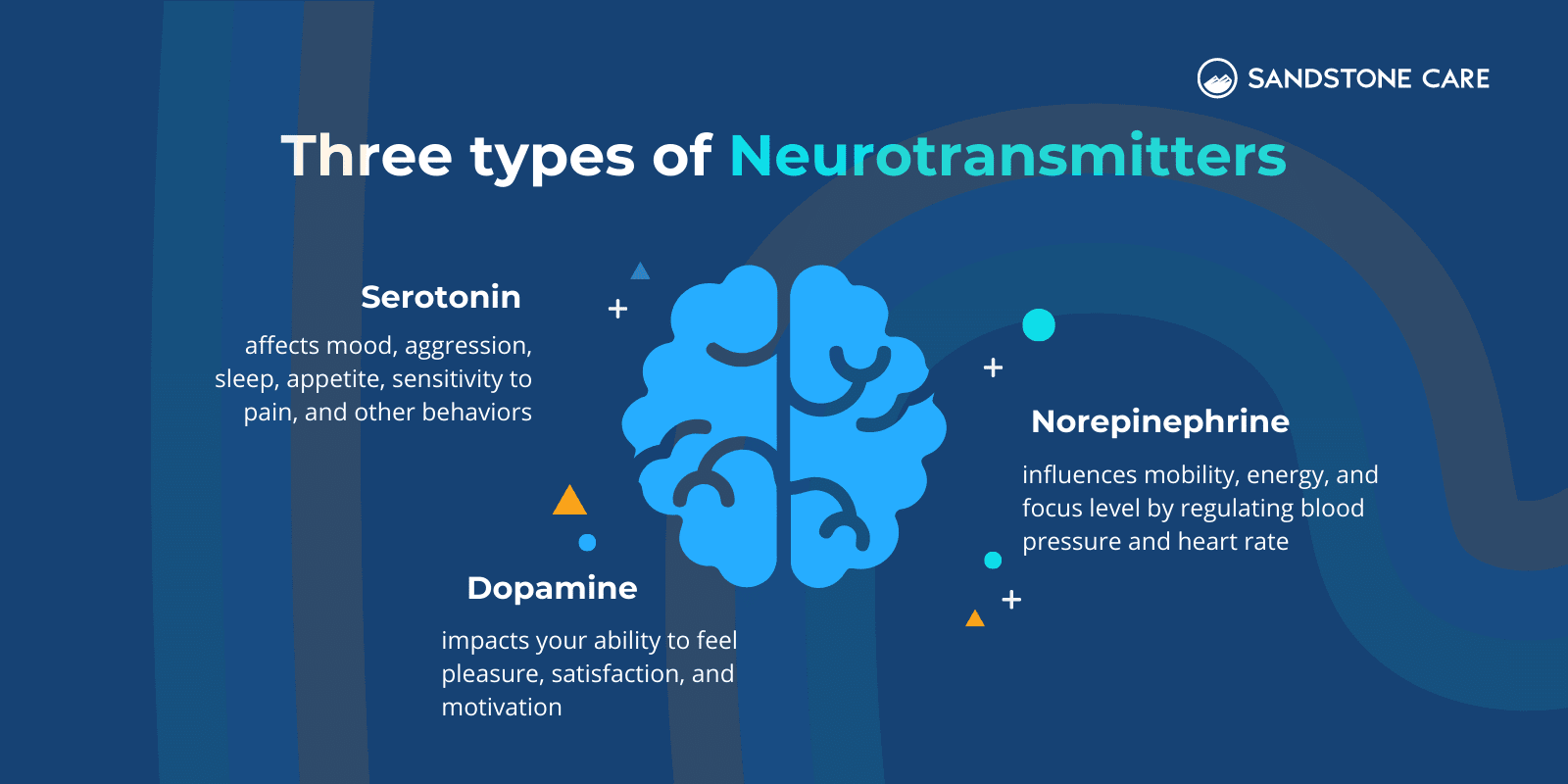
No, trazodone should not be stopped abruptly.
Doing so can trigger withdrawal symptoms and become very dangerous.
Withdrawal symptoms of trazodone can include:
It is important to always let your healthcare provider know if you plan on stopping taking medication so that they can provide you with safety, advice, and supervision if needed.
Trazodone should be tapered, meaning the daily dose should slowly decrease with the end goal of completely discontinuing the medication to reduce the risk of withdrawal symptoms.
Trazodone has a half-life of around 5 to 9 hours.
This means that it can take 5 to 9 hours for your body to eliminate half of the drug.
Yes, a person may experience withdrawal symptoms from stopping trazodone which may include:
If you or a loved one are experiencing suicidal thoughts, call 911 or the national suicide prevention lifeline at 988.
If you are experiencing withdrawal symptoms, seek medical help and call your doctor so they can give you professional guidance to help you safely manage withdrawal symptoms.

Trazodone can lead to long-term and, in some cases, permanent damage.
For example, a person taking trazodone can develop a condition known as priapism, with is an abnormal erection that can lead to permanent damage.
FAQ
Our goal is to provide the most helpful information. Please reach out to us if you have any additional questions. We are here to help in any way we can.
Aside from being used to treat depression, trazodone is also used to treat insomnia, schizophrenia, and anxiety.
However, when used for reasons other than depression, it is not FDA-approved.
It is not considered a first-line treatment for insomnia, although it can be effective in helping sleep.
The link between trazodone use and psychosis is unknown. However, there have been reports of visual hallucinations as an adverse effect of trazodone.
A visual hallucination involves seeing things that aren’t real, which may include objects, lights, shapes, or people.
Brain zaps can feel like a sudden shock in the head which is caused by anxiety, stress, or medications.
Brain zaps can happen when a person stops or decreases their use of medication, especially antidepressants.
Brain zaps may result as a symptom of withdrawal when stopping antidepressants like trazodone.
Trazodone is not known to be addictive.
However, treating sleep disorders like insomnia with trazodone is off-label use that is not approved by the FDA.
Valium, also known as diazepam, is a benzodiazepine used to treat anxiety, muscle spasms, and seizures.
Some people who have been prescribed Valium for sleep and do not see results may sometimes be prescribed trazodone as an alternative.
Trazodone is more commonly used as a treatment for depression and anxiety, while Valium is typically used for anxiety, alcohol withdrawal, and seizures.
While it doesn’t necessarily change your personality, trazodone may cause changes that affect a person’s mood and behaviors.
Adverse effects of trazodone use involve problems with thinking, concentration, and memory.
Some studies have examined the relationship between trazodone use and the development of dementia. However, it appears that more research is needed to determine whether the two are connected.


Trazodone is an antidepressant used to treat depressive disorders. Trazodone has the potential to be misused and may come with serious negative effects. Sandstone Care is here to support teens and young adults with mental health and substance use disorders.